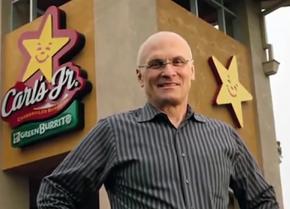The burger bosses’ dreams come true
The labor movement will face an anti-union fanatic running the Labor Department, which is why the strategy of concession and retreat is doomed, writes .
IT'S IMPOSSIBLE to decide which of Donald Trump's cabinet picks is the most infuriating and outrageous--there's just too much competition among the nominees, many of whom are sworn enemies the departments Trump wants them to run.
But Andrew Puzder as Secretary of Labor certainly has a claim on the title.
Puzder is the CEO of CKE Restaurants, the corporation that owns the Carl's Jr. and Hardee's fast-food burger chains. Unions and workers' rights advocates have criticized his appointment, pointing out that putting a fast-food CEO in charge of the Labor Department is tantamount to hiring a fox to guard a henhouse.
The Labor Department is the woefully understaffed and underfunded federal agency that is supposed to enforce workplace rules and be an advocate for working people. The Wage and Hour Division, which prosecutes wage-theft cases, falls under its jurisdiction. So does the Bureau of Labor Statistics, which compiles facts and figures about employment, unionization rates and strike statistics.

The Labor Department was set up during the Wilson administration, and historically, secretaries were clean-government reformer types or representatives of the more conservative wing of the labor officialdom.
But that's changed in the last few decades, so this isn't the first time the Labor Department would be led by someone hostile to workers' rights.
There's already a bipartisan consensus in Washington to make the Department fairly ineffective: There are only 1,100 agents nationwide tasked with investigations and enforcement of laws and regulations government workplaces around the country--that's about the same number of cops patrolling Portland, Oregon.
And this is in the midst of what the Economic Policy Institute calls a wage theft "epidemic," which costs U.S. workers literally billions of dollars a year in stolen wages.
The restaurant industry in general, and fast-food chains in particular, are characterized by some of the worst employer practices in the country, especially wage theft. Because the industry typically has thin profit margins and a large number of fixed costs (especially with franchise restaurants), one of the few variables for employers to go after is labor costs.
They do it by illegally forcing workers to work off the clock; giving them inadequate breaks, or no breaks at all; stealing tips; falsely classifying employees to skirt regulations; and a hundred other tricks that make restaurant work even more oppressive in an industry already notorious for low wages, sexual harassment and discriminatory hiring practices.
Puzder's appointment will be a victory dance for the most exploitative and small-minded section of small business owners in the U.S., who will see his confirmation as a signal that federal enforcement will become even more lax and ineffective.
PUZDER HAS been the CEO of CKE Restaurants since 2000, and no amount of dish soap and scalding water could wash the dirt off his grubby hands since taking over as chief executive.
CKE Restaurants has faced multiple class-action lawsuits for wage theft and incorrectly classifying employees to cheat them out of higher take home pay. Two-thirds of women workers at CKE Restaurants are sexually harassed at work, according to a survey of employees--which is high even for an industry with already appalling levels of harassment.
Maybe local managers are simply taking a page out of Puzder's personal playbook of hostility and degrading attitudes towards women. Puzder approved and stands by his series of semi-pornographic TV advertisements depicting bikini -clad models eating and licking a "bacon three-way burger." In an interview with Entrepreneur magazine, he defended his actions:
I like our ads. I like beautiful women eating burgers in bikinis. I think it's very American. I used to hear, brands take on the personality of the CEO. And I rarely thought that was true, but I think this one, in this case, it kind of did take on my personality.
In 2011, when asked about the shameful sexism of the ads, he retorted: "We believe in putting hot models in our commercials, because ugly ones don't sell burgers."
A major donor to the Republican Party, Puzder is well known as an opponent of raising the minimum wage to $15 an hour, the major goal of a campaign initiated by low-wage workers themselves.
Yet Service Employees International Union, which has claimed to be the union most supportive of the organizing, is already sounding the retreat. It announced that it was trimming its budget by 30 percent in anticipation of the Trump administration.
Prospects for a labor-friendly administrative ruling to allow franchise-employed workers to unionize and bargain industry-wide agreements with the parent company as a "joint employer" seem all but impossible for now.
But while prospects for low-wage workers are gloomy under Trump, it's also true that a Clinton presidency wouldn't likely have treated the Department of Labor that much differently.
It was recently reported that, despite rumors to the contrary, Hillary Clinton's pick for Labor Secretary would have been Howard Schulz, the former CEO of Starbucks, another low-wage employer hostile to unionization and a $15-an-hour minimum wage.
So as far as Secretary of Labor is concerned, the November election amounted to a choice between two fast-food CEOs taking over enforcement of workplace laws and regulations. Nothing better illustrates the corporate dominance over both political parties in the U.S.
Whatever happens under Trump, it's almost certainly the case that any gains for low-wage workers will come through their own activity and organization, not from a weak federal agency headed by an avowed opponent.
If workers have any hope of improving their conditions and winning some measure of economic security, they will have to go back to the tried-and-true methods of the labor movement: workplace power, exercised through shop committees, strikes and a credible ability to disrupt corporate profits.



